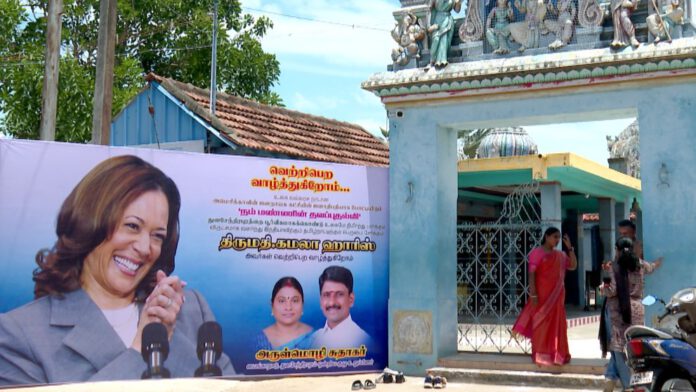
The 2020 U.S. presidential election has concluded with Joe Biden securing the presidency, and Kamala Harris, a senator from California of Black and Indian descent, poised to make history as the first female Vice President of the United States.
Although Harris’s public persona often emphasizes her identity as a Black woman, her journey to the vice presidency has been profoundly shaped by the values and support of her Indian heritage and extended family, which have been a source of strength and guidance throughout her career, transcending geographical distances.
The Gopalan family’s narrative traces back to Pegnadu, a small village south of Chennai, where Harris’s maternal grandfather was born in 1911. The Gopalan family, belonging to the Tamil Brahmin caste, occupied a prominent position in India’s social hierarchy.
Following India’s independence in 1947, her grandfather continued his service in the new government, which necessitated frequent relocations for the family. As a distinguished public servant in India, would discuss politics with his retired colleagues in morning walks. During these visits from the United States, Harris would accompany him, absorbing discussions on affirmative action, corruption, and India’s trajectory.
In a 2018 address to an Indian-American audience, Harris reflected on these formative experiences that the stories they told and their fervor for democracy deeply impacted her. Although She did not fully appreciate it at the time, those moments have significantly shaped who she is today.
Her maternal grandfather advocated for women’s rights and education long before these issues gained widespread traction. This progressive outlook profoundly influenced Harris’s mother, Shyamala Gopalan, who emigrated to the United States in the late 1950s.
Harris’s mother, the eldest of four siblings, experienced a nomadic childhood, constantly adapting to new cities as her father was reassigned. Shewas known for her melodious voice and numerous singing accolades. She pursued a degree in home economics at Delhi University, a field encompassing nutrition and child development.
When Shyamala Gopalan was accepted into the University of California, Berkeley, for a doctorate in nutrition and endocrinology—a fact unbeknownst to her family until her acceptance—her father promptly supported her educational journey, despite the financial strain on a public servant’s salary.
Shyamala Gopalan arrived at the University of California, Berkeley, at the age of 19, a time when there were few Indians in America, and her social circle was sparse. Shyamala quickly became immersed in the civil rights movement, participating in protest marches and enduring police violence, including being hit by fire hoses.
It was also where Shyamala Gopalan met Donald Harris, a graduate student from Jamaica studying left-wing economic theory. However, the marriage did not endure. Despite the separation, Shyamala Gopalan remained committed to preserving her Indian heritage. She introduced her daughters to Hindu mythology, South Indian cuisine, and regularly visited a local Hindu temple where she occasionally sang. She maintained a close connection with her parents in Chennai, returning to visit them every few years.
In her memoir, Harris reflects on her mother’s awareness of the racial dynamics in America, noting that her mother understood very well that she was raising two Black daughters. In India, reactions to Harris were varied. While some celebrated her achievements with front-page news stories, others were more skeptical.
Harris maintains a strong connection with her maternal family, whose discussions about her political battles in San Francisco, Sacramento, and Washington, D.C., are filled with a deep engagement as though they are closely involved in her journey.
Her uncle, G. Balachandran, residing in New Delhi, fondly recalls a visit to Harris in California around 15 years ago. At the time, as San Francisco’s District Attorney, Harris faced significant criticism for her decision not to pursue the death penalty against a man accused of killing a police officer. Harris deemed the death penalty morally and pragmatically flawed, citing concerns over racial disparities and the high costs associated with such cases. Despite immense pressure from law enforcement and prominent state figures, Harris stood firm. Balachandran attributes Harris’s resolute stance to her mother’s influence that it is important not to be manipulated by anyone.
Despite some criticism in India regarding her foreign policy stances during her tenure as a senator, Harris has evoked considerable pride across the country, particularly in the coastal community of her family’s origins.
Kamala Harris has voiced concerns regarding Kashmir, particularly in light of the Indian central government’s decision to revoke the region’s autonomous status last year. Her criticism intensified when India’s foreign minister declined to meet with an Indian-American congressman who had expressed dissenting views on the Kashmir issue.
Kashmir remains one of the most contentious subjects in Indian politics. While Harris’s ascent to a prominent political role has been celebrated by many on the Indian left, she has faced criticism from the right, with some labeling her as disloyal.
Harris has not visited India since her mother’s passing 11 years ago. Fulfilling her mother’s last wish, Harris eventually returned to India with her mother’s ashes.
Source: The Indian Express, BBC



